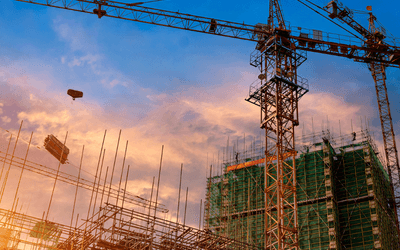Think of any industry and it’ll likely have been influenced by the emergence of Artificial Intelligence. The Construction industry is certainly one of them, having experienced significant development and transformation in recent years, driven by the power of new technologies including AI.
And, as AI continues to evolve, its influence on construction is continuing to grow, enabling greater efficiency, increased safety, and technological innovations within the sector. Despite the growing role of tech and artificial intelligence technology, however, the skills, expertise and experience of the construction workforce remains crucial to its future.
The Role of AI in Construction
The seemingly endless applications of Artificial Intelligence are revolutionising construction projects and their associated aspects, from project planning to on-site safety.
By leveraging advanced algorithms and machine learning, AI is helping to optimise processes, reduce costs, make for more efficient ways of working, and improve overall project outcomes.
Some key areas where AI is making a significant impact include:
Construction Project Planning and Management
AI algorithms can analyse vast amounts of data from past projects to predict potential delays in similar future projects, identify risks, and recommend ways to overcome such challenges. Machine learning models trained on historical data can forecast bottlenecks, allowing managers to take proactive measures to keep projects on track. This boosts productivity and reduces costs.
Construction Site Safety
AI-powered computer vision technologies monitor construction sites in real-time, identifying a variety of safety hazards, including workers not wearing protective gear or machinery operating outside safe parameters. These systems can alert site managers and safety officers immediately, helping to prevent accidents and improve overall safety compliance.
Optimising Construction Designs
Generative design, an AI-driven process, enables architects and engineers to input specific design goals and constraints, such as materials, budget, and building codes, and receive a range of optimised design options. This speeds up the design process and ensures that the final plans are more efficient and cost-effective.
Robotics and Automation
AI-powered robots and autonomous machinery are revolutionising construction sites by handling repetitive labour-intensive tasks. For example, brick-laying robots can construct walls quickly and precisely, whilst AI-guided excavators and bulldozers can operate autonomously – handling some of the more dangerous tasks instead of human workers.
Challenges of Implementing AI
While AI offers numerous benefits, its implementation in the construction industry is not without challenges – obstacles that must be addressed to fully realise the potential of AI and integrate it successfully and safely within construction processes.
Integrating AI into construction processes can be complex due to the need for specialised knowledge and expertise, for example. This includes understanding both AI technologies and construction practices to ensure seamless integration. What’s more, with the construction industry traditionally resistant to change and adopting new tech, it can prove difficult to present the case for finding such knowledge, expertise and implementing AI.
The potentially high costs of investing in Artificial Intelligence can make arguing the case for AI in construction tricky too, whilst – as with the implementation of any new technologies, methods and tools – there will likely be queries regarding the scalability and adaptability of AI to use across projects.
The use of Artificial Intelligence must comply with construction industry regulations and standards, and navigating this regulatory landscape can be challenging. Meanwhile, there must be considerations on how to protect data and ensure the security of any AI systems which could be subject to cyber-attacks and data breaches.
The Continued Need for Human Skills
There is no doubt that Artificial Intelligence is already making its mark in the construction industry – an impact that’ll likely increase in the years and decades to come, especially as the technology and its uses evolve. But, as we’ve highlighted, the use of AI in construction presents plenty of challenges too.
As such, despite the rapid advancements in Artificial Intelligence and technology, human skills will remain vital in the construction industry, providing:
Problem-Solving and Critical Thinking
AI can analyse data and provide recommendations, but human workers are needed to interpret these insights and make informed decisions. Construction projects often encounter unexpected challenges that require creative problem-solving and critical thinking, skills that AI cannot fully replicate.
Communication and Collaboration
Effective communication and collaboration are essential for successful construction projects. They require coordination between various stakeholders, including clients, architects, engineers, and subcontractors, and strong interpersonal skills are integral.
Adaptability and Flexibility
Construction sites are dynamic environments where conditions can change rapidly. Human workers can adapt to these changes and make quick decisions to keep projects on track. AI systems, while powerful, may not always be able to respond to unforeseen circumstances with the same level of flexibility.
Technical Expertise
While AI can assist with design and planning, human expertise is still required for tasks such as operating machinery, performing quality control, and ensuring compliance with safety regulations. Skilled workers are essential for maintaining the high standards of craftsmanship and safety that the construction industry demands.
Carbon60: Construction Specialists
The future of construction is in the continued expertise and dedication of human workers, supported by the power of Artificial Intelligence and other groundbreaking technologies.
Carbon60 have decades of experience in supporting main contractors, specialist sub-contractors, and consultancies across entire construction project lifecycles, connecting companies with the right talent they need to meet their specific skills and expertise requirements.









